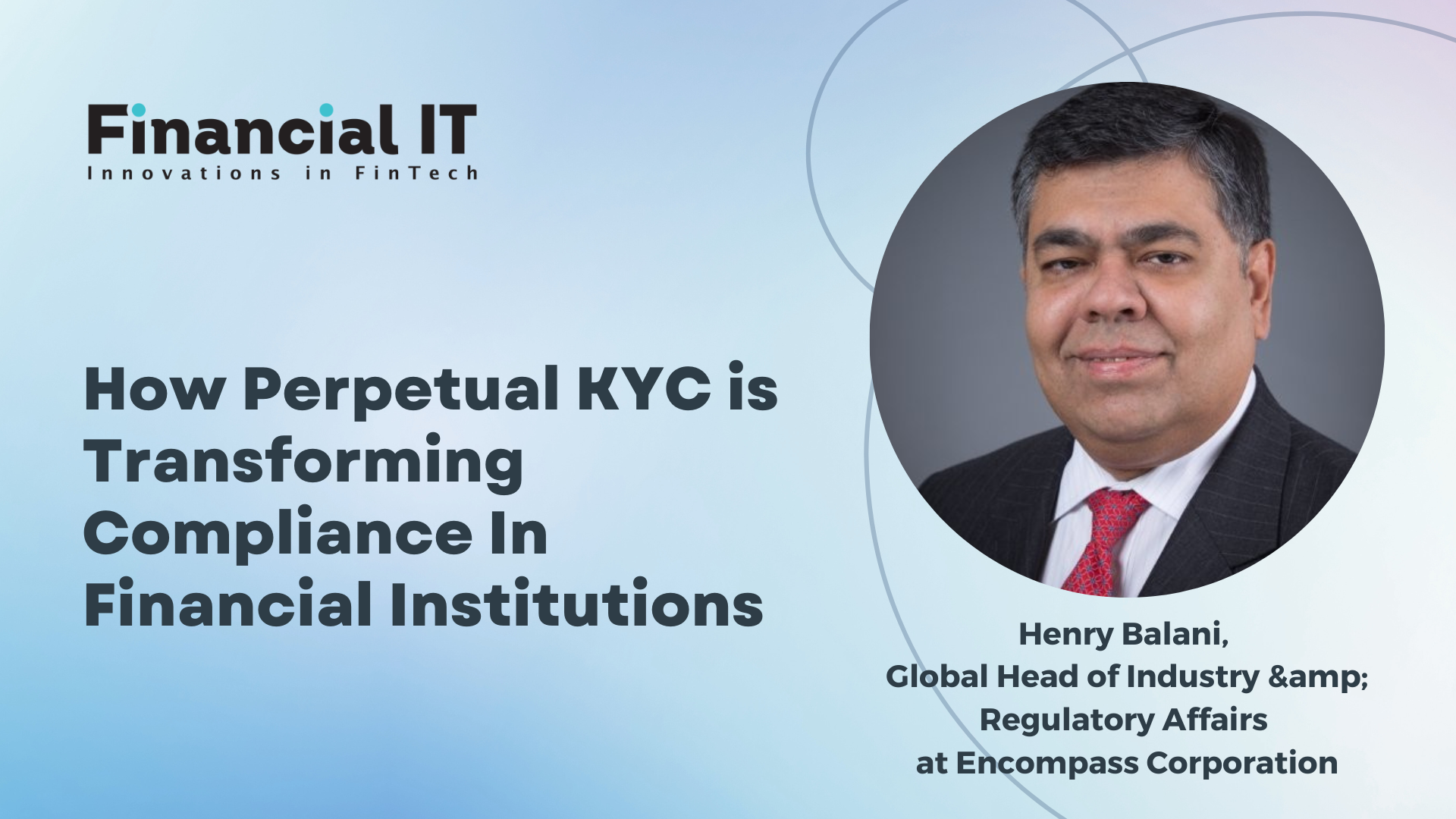How Perpetual KYC Is Transforming Compliance In Financial Institutions

- Henry Balani, Global Head of Industry & Regulatory Affairs at Encompass Corporation
- 09.08.2024 02:00 pm #PerpetualKYC #ComplianceTransformation
The traditional banking and finance industry is evolving, as processes are experiencing a digital transformation as a result of perpetual Know Your Customer (pKYC). The pKYC approach enables modern banks to continuously update and verify customer information in real time, moving away from the reliance on periodic reviews. This change is driven by technological advancements and the increasing demand for dynamic and responsive regulatory compliance mechanisms.
Conventional KYC processes commonly involve periodic reviews of customer information and fixed intervals. These reviews are typically conducted every one, three, or five years. While these reviews are thorough and comprehensive, they are also static and can result in outdated information, potentially overlooking changes in customer risk profiles or new compliance requirements.
On the other hand, perpetual KYC is dynamic and event driven. Through its continuous and automated approach, pKYC enables financial institutions to address risks and compliance needs in real-time. These risks can be determined by continuously monitoring customer activities and automatically updating profiles in response to specific triggers, including changes in personal information, significant transactions, or alterations in beneficial ownership.
Gaining a competitive advantage with pKYC
By leveraging pKYC, banks, and other regulated financial institutions can take advantage of a range of benefits that are crucial in the modern digital era to gain a competitive edge. Through continuous monitoring, pKYC enables financial institutions to identify and address potential risks promptly. This real-time approach helps mitigate risks associated with financial crimes and ensures compliance with the latest regulatory standards.
pKYC will lead to operational efficiency and cost reduction. By automating many of the manual processes involved in KYC, pKYC significantly reduces the time and resources needed for compliance, allowing financial institutions to focus their efforts on high-risk cases, rather than conducting blanket reviews for all customers, resulting in substantial cost savings.
This process also enables many banks to improve their customer service and management, but also enhance the customer’s experience. With pKYC, customers are not subjected to frequent, intrusive reviews if their profiles remain stable. This results in a smoother and more positive customer experience, potentially increasing overall customer satisfaction and loyalty. Additionally, automated systems minimise human error and ensure consistency in applying KYC policies, enhancing overall regulatory compliance and reducing the risk of non-compliance penalties.
Perpetual KYC implementation: Challenges and considerations
Implementing a pKYC operating model is not straightforward and requires the right blend of infrastructure and operating process. Every firm’s pKYC journey and ecosystem will be unique and cut across people, processes and technologies.
Data is central to the success of pKYC as reviews based on event changes (aka event driven triggers) will not be effective if client information is outdated, missing or incorrect. Without consistent access to relevant and accurate client information, pKYC is impossible. Corporate Digital Identity (CDI) is fast emerging as a foundation for ensuring valid customer information is collected for successful pKYC operations.
Being able to leverage this data requires an ecosystem of technology, which may be developed in house, utilizing third-party RegTech providers, or a combination of both. This technology should drive how data is stored, structured and accessed so that pKYC triggers can be comprehensively managed. Customer lifecycle management systems (CLMs) are particularly relevant to pKYC as they connect all components along the workflow processes.
Importantly, overarching executive sponsorship is needed to ensure a successful outcome in transformation initiatives. Recognizing the structural and cross departmental challenge, Influential sponsors will align the multiple stakeholders involved in driving this change and will champion a firm’s pKYC strategy and approach to regulators and other key stakeholders.
Ultimately, pKYC must be future-proof and scalable, ready to adapt in line with business strategy and regulation to keep firms competitive.
The future of pKYC
The adoption of pKYC is growing, driven by regulatory pressures and the increasing complexity of financial crimes. Financial institutions are recognising the benefits of a proactive, real-time approach to compliance and risk management. The move towards pKYC is seen as a necessary evolution to stay ahead in a highly regulated and competitive financial environment.
As the technological landscape continues to evolve, integrating advanced technologies such as blockchain and further developments in AI and ML will likely enhance pKYC systems’ capabilities. Ensuring higher levels of compliance and risk mitigation, these technologies are able to provide more robust and secure mechanisms for customer verification and monitoring.
Blockchain technology can be utilised to further improve the initial customer authentication and validation process. As a result, we can expect improvements and advancements in the quality of customer data collected during initial customer onboarding processes. Financial institutions can then leverage AI-enhanced tools that can identify and collect the necessary attributes during document processing stages. This ensures that pKYC will utilise relevant, accurate, and up-to-date data.
Perpetual KYC represents a significant departure from traditional, periodic KYC, as it offers a wide range of benefits in real-time risk management, operational efficiency, and customer experience. Although the implementation of pKYC poses certain challenges, it also provides numerous advantages, making it an increasingly attractive solution for financial institutions aiming to enhance their compliance and risk management frameworks and maintain a competitive edge in a rapidly evolving regulator landscape.



















